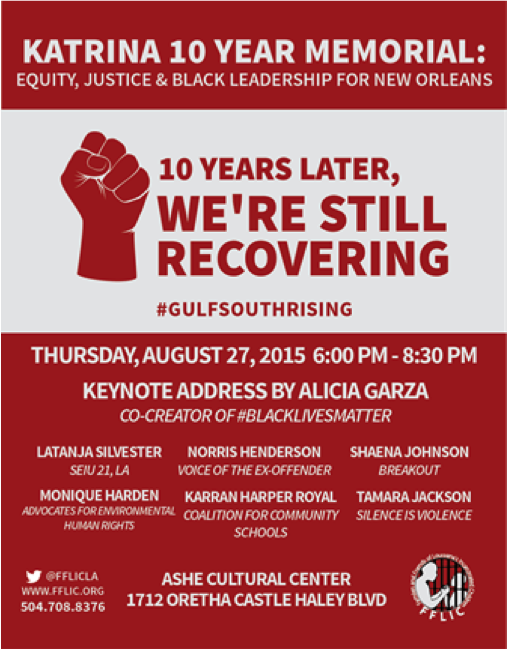New Orleans Communities Expose Unjust Realities of Recovery 10 Years After Katrina

This Saturday, August 29, 2015, marks the 10th anniversary of Hurricane Katrina, the storm that devastated the Gulf Coast in 2005 and displaced hundreds of thousands of people. Over the past 10 years, as communities in New Orleans and other Gulf cities have fought to return home and rebuild, the recovery effort has prioritized private profits over people, leading to the dismantling of public housing, the privatization of schools, the ongoing criminalization and displacement of Black communities, and growing racial inequality.
Throughout this week, while elected officials and business leaders are celebrating the so-called progress of recovery efforts, local communities are bringing attention to the growing injustices and to the Black community leadership that is fighting back.
On August 27th, NESRI’s partner Families and Friends of Louisiana’s Incarcerated Children (FFLIC) is hosting a Katrina 10 Year Memorial Event to demand Equity, Justice and Black Leadership for New Orleans. You can watch the event, featuring Alicia Garza of #BlackLivesMatter via live stream at this link. The Memorial is part of the Katrina 10 Week of Action organized by #GulfSouthRising.
FFLIC also partnered with the Advancement Project to launch the KatrinaTruth.org website to demonstrate the stark difference between the progress claimed by elected officials in New Orleans, and the reality faced by Black communities.
The recovery data documented on the KatrinaTruth.org website includes:
- African-Americans were pushed out of New Orleans: in 2014, 229,823 African-Americans lived in the city, which is only 69% of the African-American population prior to Katrina.
- The median income for Black families in New Orleans is $25,102, compared to $60,553 for white families.
- 50.5% of Black children in New Orleans live in poverty – a higher rate than before Katrina.
- Much of public housing was demolished against the protests of residents: only 2,006 public housing units are now available, compared to 12,270 before Katrina.
- 92% of students are now enrolled in privately managed charter schools, many of which fail to accommodate students with disabilities or limited English proficiency and use harsher discipline policies.
- In 2013, there were 46,625 out-of-school suspensions, more than the total number of students enrolled in New Orleans public schools that year.
- New Orleans leads the state of Louisiana in the number of juveniles transferred to adult court, with an average of 32 juveniles transferred per year between 2010 and 2013.
- There are 5 times as many Black inmates in Louisiana prisons as whites, even though the state’s general population of Blacks is only half that of whites.
These stark racial inequities confirm NESRI's initial concerns, which we raised in our 2005 statement: "As the reconstruction conversation moves on, the same community is being left behind once again, but this time there are no stark and painful images to prick the conscience of America. […] In the wake of Katrina we must face the fact that to different degrees New Orleans represents all of the U.S. There is no locality where communities aren’t facing extreme poverty unnecessarily, and where that poverty isn’t disproportionately shaped by race." At the time, we called for a human rights agenda for New Orleans, and today we join our partners and allies in the Gulf cities to restate that demand: in New Orleans and beyond, we need to rise up to make equity and dignity a reality for everyone, leaving no community behind.
